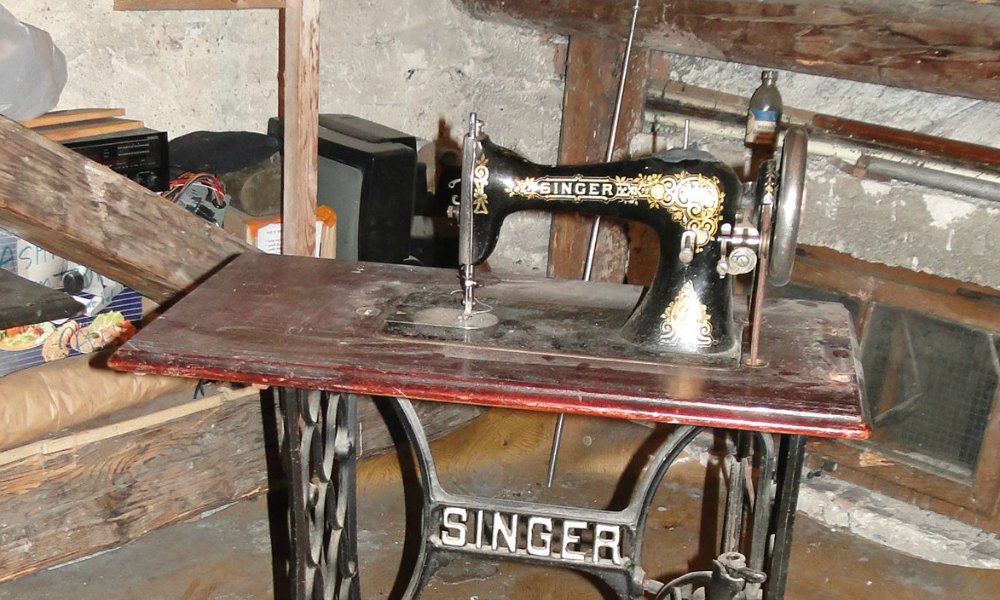Especially for us Ron (Romek) Unger, now living in the USA, recorded a video-interview about what role Madritsch played in his and his family's life. Ron's Father, Moses (Moniek) Unger and Leah (Lotka) Unger, lived in Tarnów even before the war. Moses had his workshop and a shop with gramophones, bicycles, typewriters and sewing machines in Walowa Street. As a little boy, Ron learned from his father how to repair this type equipment, which proved useful when Julius Madritsch was looking for people to service sewing machines in his Tarnów factories.
-

Sewing machine used at the Madritsch plant
Maszyna do szycia używana w warsztacie Madritscha
-

Tree devoted to Julius Madritsch at Yad Vashem
Drzewko poświęcone Juliusowi Madritschowi w Instytucie Yad Vashem
-

Article about our project in local newspaper
Artykuł o naszym projekcie w lokalnej gazecie
-

List of workers at the Madritsch plan in Tarnow
Lista pracowników tarnowskich zakładów Madritscha
-

Location of one of Madritsch plants in Tarnow
Miejsce położenia jednej z tarnowskich fabryk Madritscha
Pokazywanie postów oznaczonych etykietą Memories of. Pokaż wszystkie posty
Pokazywanie postów oznaczonych etykietą Memories of. Pokaż wszystkie posty
środa, 31 maja 2017
Ron Unger remembers Madritsch - exclusive video interview
Marcin Zaród21:15Julius Madritsch, Lwowska, Madritsch, maszyny, mechanic, mechanik, Memories of, Mojżesz Unger, Plasow, Płaszów, Ron Unger, sewing, testimony, Unger, video testimony, Wałowa, warsztaty, workshops, Wspomnienia
Brak komentarzy

środa, 22 marca 2017
Julius Madritsch in Gizela Fudem's memories
Gizela Fudem was able to convey the atmosphere of pre-war Jewish Tarnow. She told her Holocaust story several times to newspapers and to Polish and international organizations. She talked about her escape from the ghetto and about complications and difficulties that she has to contend with.
Another action was going to take place in the ghetto. Most of people knew what would happed, Gizela too, and that’s why she left the ghetto. The day after, they took away her parents and her brother.
Gizela made contact with Gabriel, who lived in Lwowska Street - the border of the ghetto. Gizela, together with her sister worked at a German company, Madritsch, where they sewed. This girl came to the shop, where Gizela worked and offered her a help. She proposed to hide her if she needed. During the second action Gizela didn’t get a special stamp, so she wasn’t safe. She decided to escape. After working hours in the factory, Gizela Fudem remained in the bathroom upstairs - where was situated Madritsch’s factory. With many difficulties (because the gate was closed and Gabriela have to lied to the guard) this friend took her away. Gizela didn’t have the proper documents to leave the country. She had only a proof of identity and false ‘Ausweis’. After her escape, there was a next action in the ghetto. They took Gizela’ parents and brother. Because of despair her sister, Gizela decided to go back to the ghetto. She went there together with the people which came back from work. The parents and brother of Gizela Fudem died in Belzec. After the ghetto liquidation, Gizela and her sister worked in Plasow for the same company which management of that firm was from Cracow. They lived in barracks, 100 or 200 people in each. As Gizela stated, the food at Madritsch's wasn't too bad. It was organized some extra bread. For Madritsch’s employees they were bringing food from the outside and they used to get a quarter of a loaf of bread for exceeding the norm, so these ones that sewed better, sewed as much as they could, taking work from the ones that sewed slower. At the end, they all shared a loaf of bread between each other. Then Gizela with her sister were transferred to the Auschwitz. There, they shaved their heads, took away their clothing. Gizela got lucky because for a short time she worked as a cleaner for the camp officers, but later she worked manual. Gizela Fudem and her sister were saved by their uncle before transport from Auschwitz out of which nobody survived beyond them.















